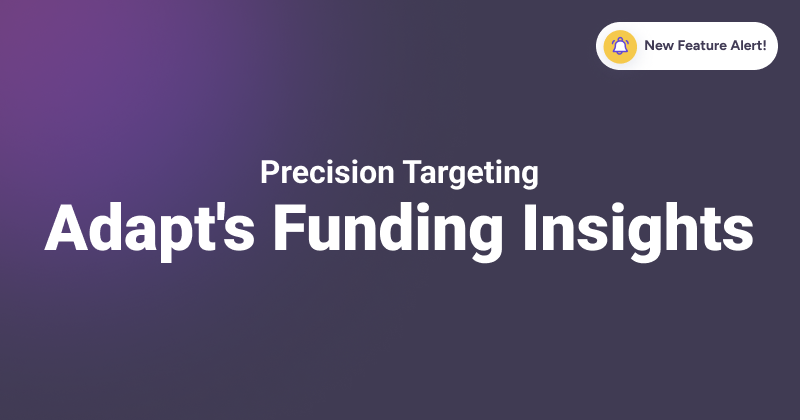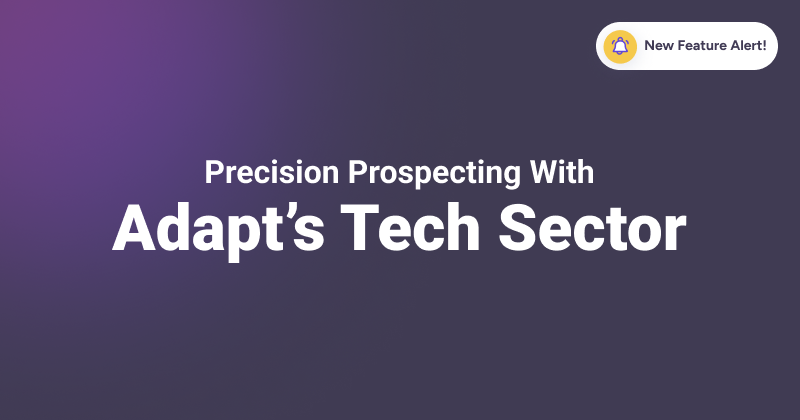Over the past few years, AI has revolutionized the sales process, making it more effective and less intrusive, driving unprecedented revenue growth.
Sales intelligence has empowered companies with profound insight into their market’s purchasing behaviors, offering a level of understanding that was once beyond reach.
Consider this:
Recent studies show that the global sales intelligence market has soared to USD 5.60 Billion, with its expansion significantly driven by AI-driven solutions like chatbots, customer targeting tools, and data enrichment technologies.
Platforms such as Adapt.io enable marketers to streamline lead scoring and nurturing through marketing automation. Sellers must harness sales intelligence to enhance their closing tactics.
Buyer expectations are evolving rapidly, with a growing demand for personalization at each phase of the sales process. This necessitates using accurate and pertinent data, which is the role of sales intelligence.
It equips sales teams with the tools to operate more efficiently by automating lead generation, collating essential insights on prospects, and refining outreach strategies. This results in a more streamlined approach to identifying, engaging, and converting potential accounts.
This blog offers a comprehensive guide to sales intelligence, covering its definition, benefits for deal closure, the top tools available, and much more.
What is Sales Intelligence?
Sales intelligence refers to the assortment of tools, methods, and systems utilized for collecting sales data. This includes information about potential clients, the status of the sales pipeline, optimal practices for sales representatives, and more.
Every B2B sales intelligence tool is crafted to enhance your ability to leverage crucial data effectively. The advantages they offer can be distilled into two primary categories:
Sales Effectiveness
This aspect measures the success of each customer interaction not in terms of financial gain or time spent but through the quality of human connections established. An effective sale strikes the perfect balance between appealing to emotions and logic.
Sales intelligence platforms amplify sales effectiveness by equipping representatives with the insights to make well-informed choices. Access to timely and relevant data ensures that your team can engage meaningfully, building rapport and trust with prospects.
Sales Efficiency
This evaluates the sales process in terms of its speed and precision.
Sales intelligence tools also streamline efficiency by enabling representatives to improve their sales tactics by analyzing their actions and benchmarking against the industry’s best practices. This simplifies the sales process and fosters a culture of continuous learning and improvement within the team.
Who should use sales intelligence?
Sales intelligence tools are designed for a wide array of users within the business realm, particularly benefiting those in roles directly connected to the sales and marketing pipeline. Primarily, sales representatives stand to gain significantly from these tools, as they provide a wealth of information on potential leads, insights into customer behavior, and competitive intelligence. This data is invaluable for tailoring sales pitches, prioritizing leads based on their likelihood to convert, and crafting personalized outreach strategies.
Similarly, marketing professionals benefit from sales intelligence by understanding market trends, customer needs, and the effectiveness of various marketing strategies. This information can inform content creation, advertising campaigns, and overall marketing strategy, ensuring that efforts are aligned with customer interests and behaviors.
Sales managers and executives use sales intelligence to monitor the health of the sales pipeline, forecast sales, and make informed decisions about strategic directions. The insights gained can help in resource allocation, territory planning, and setting realistic sales targets.
In a nutshell, anyone involved in attracting, engaging, and converting prospects into customers should consider using sales intelligence. It equips teams with the knowledge to make informed decisions, improve sales and marketing effectiveness, and drive revenue growth.
How does sales intelligence help you close more deals?
Sales intelligence has become indispensable for sales professionals aiming to enhance their performance and close more deals. By leveraging comprehensive data analysis and insights, sales intelligence platforms enable sales teams to identify, engage, and convert potential leads more efficiently than ever.
This transformation in the sales landscape is powered by various capabilities of sales intelligence tools, including finding qualified accounts, generating new leads automatically, tracking company buying signals, and engaging with decision-makers.
Let’s explore how each of these features contributes to closing more deals.
Easily Find Qualified Accounts –
The foundation of any successful sales strategy is focusing on the accounts most likely to convert. Sales intelligence tools can filter vast amounts of data to identify these qualified accounts. Advanced analytics and predictive modeling allow these platforms to pinpoint businesses that match the ideal customer profile based on industry, company size, and revenue.
This precision targeting means sales teams spend less time sifting through unqualified leads and more time engaging with prospects who are more likely to purchase. Moreover, by having access to detailed company information, sales professionals can tailor their pitches to meet each account’s specific needs and pain points, significantly increasing the chances of a successful sale.
Generate New Leads Automatically –
Lead generation is still one of the most time-consuming tasks for sales reps. Sales intelligence platforms can easily automate this process by continuously scanning multiple data sources for potential leads, including social media, news feeds, and company websites. This automation saves time and ensures the sales pipeline is constantly replenished with new prospects.
Furthermore, these tools use the latest technology and complex algorithms to evaluate the quality of leads based on predefined criteria, ensuring that only the most promising prospects are passed onto sales teams. This streamlines the lead generation process, allowing sales professionals to focus on nurturing and converting leads rather than finding them.
Track Company Buy Signals –
Buy signals, or trigger events, signal that a company is in a position to invest in your offering, triggered by occurrences such as securing new funding, appointing a new executive, or going public.
Understanding when a company is ready to purchase can give sales teams a competitive advantage. Sales intelligence tools monitor online behaviors and activities that indicate a company’s buying intentions, such as visiting specific web pages, downloading whitepapers, or engaging with competitor content.
Acting swiftly during these moments can significantly increase your chances of capturing their interest ahead of competitors. Sales intelligence platforms are adept at detecting these events as they happen, promptly alerting you — this timely insight can be the key to securing more significant, more lucrative contracts.
With platforms like Adapt, you can tailor alerts for specific companies of interest. Adapt will inform you immediately when relevant buy signals occur, allowing you to respond swiftly and effectively.
This proactive approach, informed by real-time data, ensures that sales efforts are timely and highly relevant to the prospect’s current needs.
Find and Engage with Decision-Makers –
Ultimately, the success of any sales effort hinges on engaging with the right people within an organization. Sales intelligence platforms offer detailed insights into company hierarchies, identifying key decision-makers and influencers. This information is vital for personalizing outreach efforts and ensuring that sales pitches are directed at individuals with the authority to make purchasing decisions.
Moreover, sales intelligence can reveal these decision-makers preferred communication channels and interests, allowing sales professionals to craft messages that are more likely to resonate and elicit a response. Whether through personalized emails, targeted social media engagement, or direct calls, understanding the best way to reach and engage decision-makers can dramatically increase the effectiveness of sales strategies.
The fundamental elements of sales intelligence
Sales intelligence is powered by B2B data, serving as its cornerstone. To comprehensively understand your prospects, it’s essential to amalgamate various data points from both personal and organizational levels. This approach enables the creation of focused lead lists and the enhancement of cold outreach efforts.
Below are critical types of sales intelligence data vital for effective sales strategies:
Accurate Contact Data
In the ever-evolving business world, having access to up-to-date contact information is crucial to maintaining connections with prospects through promotions and job changes. A sales intelligence database that offers real-time updates is invaluable for staying in contact with your target list.
Company and Account Data
Firmographic data is crucial for analyzing companies, segmenting audiences, and understanding market potential. Insightful data on a company’s industry, size, and revenue helps sales teams allocate resources wisely.
Integrating account, contact details, and data allows sales leaders to forecast more accurately, develop strategic plans, and drive growth.
Intent Data
Intent data transforms sales intelligence by identifying accounts and seeking solutions based on content consumption. This information is crucial for timing sales pitches perfectly and getting ahead of the competition.
Bombora, a premier provider of intent data, collaborates with platforms like Adapt to help businesses connect with the right prospects at the optimal moment.
Technographic Intelligence
Technographic data offers the ability to understand a target company’s or prospect’s technology stack. This intelligence can reveal operational workflows and how your solution might improve them. It’s precious when your product addresses issues overlooked by competitors.
Sales Event Triggers
Sales triggers inform you of significant changes within target companies or prospects that could unveil new sales opportunities. These can range from leadership changes to acquisitions or public listings, providing a rich context for potential sales engagements.
By synthesizing these diverse sales intelligence insights, sales and marketing teams can secure a competitive advantage. Teams with the highest quality data are positioned well ahead of their competition, leveraging this information to tailor their strategies and win more deals.
Challenges You May Face While Adopting Sales Intelligence
Incorporating sales intelligence software brings various challenges, from mastering the technology to integrating it with current systems, ensuring staff uptake, maintaining data quality, and navigating security and compliance concerns. A key hurdle involves the accurate collation and integration of data alongside smooth incorporation into existing infrastructures, demanding specialized knowledge and collaboration with IT departments.
When adopting sales intelligence solutions, issues such as ensuring data precision and integrity, system integration, fostering user engagement and training, evaluating cost-effectiveness, and adapting to ongoing changes are prevalent. Addressing these issues is essential for businesses to capitalize on the advantages of sales intelligence software, which offers profound insights into customer behavior and enhances sales productivity and results.
Account-based vs. lead-based sales intelligence tools
When evaluating sales intelligence platforms, it’s important to consider key features that set them apart. Among these, understanding whether a tool focuses on account-level or lead-level data is essential. Here’s an overview of the distinctions:
Lead-level tools
collect data about individual prospects, including names, job positions, and contact information. However, such tools might not provide insights into the prospect’s organizational readiness to purchase. This could lead to additional work, as you may need to individually assess each lead to determine if their company has the demand and financial capability for your product.
Conversely,
account-based platforms
prioritize identifying high-quality leads by first zeroing in on relevant organizations. These tools enable detailed searches within your target market, focusing on specific industries or financial stages and subsequently identifying key contacts within those organizations. This approach ensures you dedicate your efforts to companies that align with your ideal customer profile, thereby enhancing your potential to close deals successfully.
Best sales intelligence tool – Adapt.io
Sales intelligence doesn’t aim to replace your existing tools or team members – it supercharges them! Providing precise, timely data empowers you to target the perfect leads at the ideal moment, maximizing your conversion rates.
In today’s market, sales intelligence isn’t just an option; it’s a necessity. Choose a platform with specific features to unlock this competitive edge. Access to accurate, relevant, and comprehensive data is critical to engaging suitable leads at the perfect time, thus improving conversion rates. With an array of sales intelligence tools at your disposal, selecting one that matches the specific functionalities you’re looking for is crucial.
Consider exploring Adapt, a powerful data intelligence platform tailored to your requirements. Learn how leveraging precise and detailed data can empower you to identify and engage the most viable leads exactly when they’re most likely to convert.
Wrapping Up
In the competitive sales world, intelligence is more than just a buzzword—it’s a strategic advantage. By leveraging sales intelligence tools, sales teams can easily find qualified leads, generate new leads automatically, track company buying signals, and engage with decision-makers more effectively. These capabilities streamline the sales process and increase the precision and relevance of sales efforts, leading to higher conversion rates and more closed deals.
The impact of sales intelligence extends beyond just improving efficiency; it transforms how sales professionals approach the art of selling. By providing a deeper understanding of prospects and their needs, sales intelligence empowers sales teams to build stronger, more meaningful relationships with potential customers. In an era where personalization and timing are key, sales intelligence offers the valuable insights necessary to tailor sales strategies to the unique landscape of each deal.
As we look to the future, the role of sales intelligence in closing deals is set to grow even more significant. With continuous advancements in data analytics, artificial intelligence, and machine learning, sales intelligence platforms will become even more sophisticated, offering deeper and actionable insights and actionable recommendations. For sales professionals, staying ahead in this dynamic environment means embracing sales intelligence as a tool and a fundamental part of their sales strategy.
In conclusion, sales intelligence transforms the sales landscape, providing sales teams with the data-driven insights needed to close more deals. By enabling more targeted, efficient, and personalized sales efforts, sales intelligence is not just helping sales professionals meet their quotas—it’s helping them exceed them. For those looking to stay competitive in the fast-paced world of sales, the question is no longer whether to use sales intelligence but how to leverage it most effectively to drive success.
FAQs
A sales intelligence tool is a specialized software platform for collecting customer information. These tools play a crucial role in enhancing your business by focusing on three main areas:
- Enhancing prospecting and outreach efforts
- Enriching firmographic data
- Providing insights on purchase intent
While not every sales team may find sales intelligence to be essential, it offers significant advantages, including:
- Reducing the length of sales cycles
- Facilitating deeper, more personalized conversations with sales prospects
- Utilizing purchase intent signals to engage with customers at moments of heightened buying interest
Adapt is a distinctive sales intelligence tool that gathers customer data to offer current insights and recommendations. Its goal is to enrich the customer experience and significantly increase customer satisfaction, serving as a valuable asset to any sales strategy.



